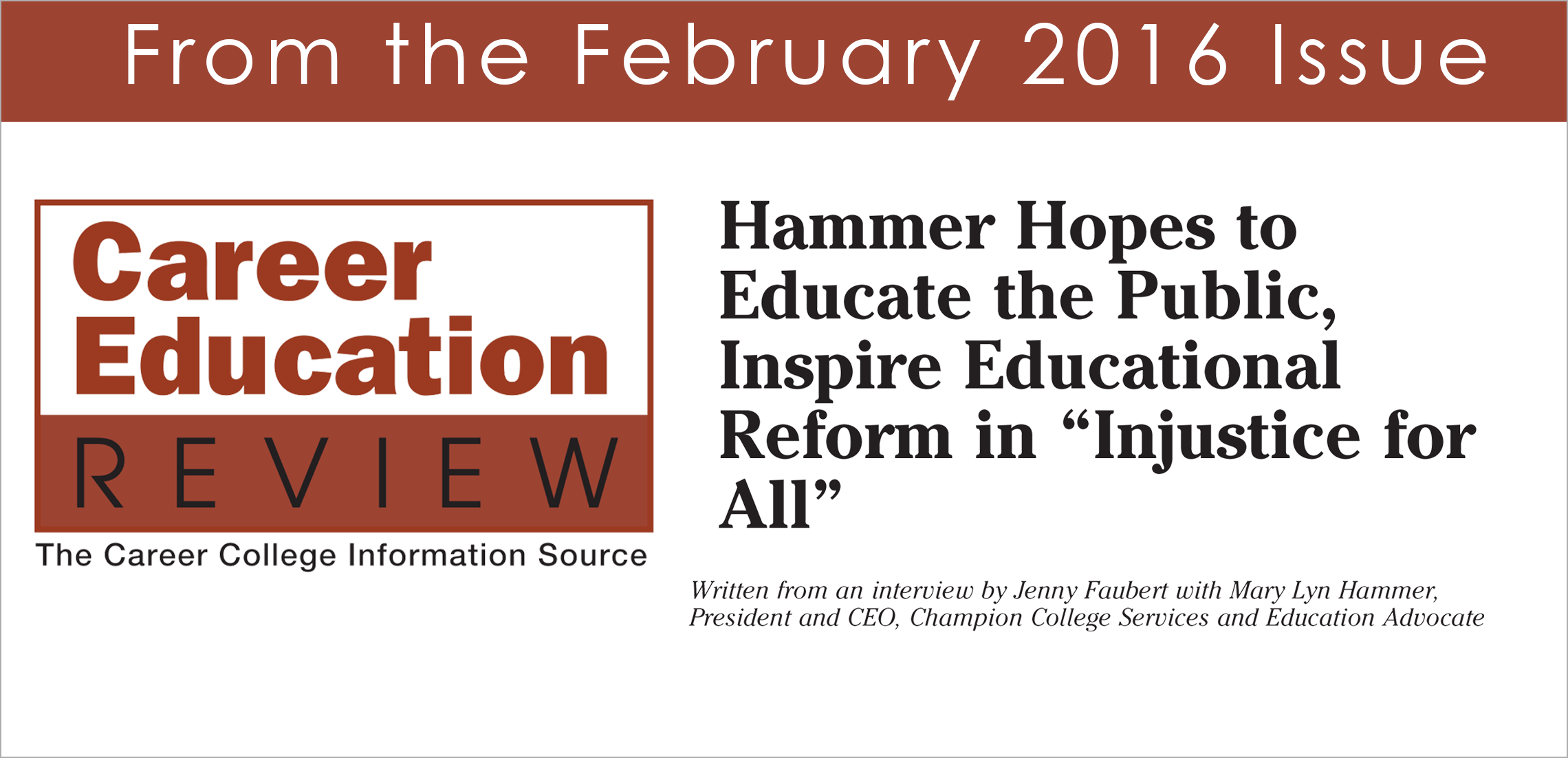
Reviews
Read what higher education new outlets Career College Central and The Chronicle of Higher Education have to say about Injustice for All.

Written from an interview by Jenny Faubert with Mary Lyn Hammer, President and CEO, Champion College Services and Education Advocate
Mary Lyn Hammer said she vacillated between rage and sorrow when she felt the U.S. Department of Education forced one of her client’s schools to unjustly close. But instead of just being mad or sad, she vowed to dig deep and discover what had really happened.
The result is her special report, “Injustice for All,” which was hand delivered to key members of Congress the week of Jan. 5, and went on sale to the public on Jan. 22. Hammer hopes “Injustice for All” will help to stabilize the education industry and inspire productive reform.
“I want Congress to take this information seriously,” she said. “They’re going into Reauthorization and the next Reauthorization of the Higher Education Act is going to be in six years; the laws need to be written based on the truth, not on some manufactured agenda or data. That’s the only way we’re going to get quality education, and our kids deserve that.”
She also hopes her report will make the DOE correct all of the schools’ default rates, and not just the ones that are subject to sanctions. Lastly, and most importantly, she hopes “Injustice for All” will get students’ loans wrongly defaulted during the transition to 100 percent direct lending put back into good standing and their good credit ratings restored.
“The bottom line is that Congress needs to take these kids out of default and clean up their credit scores—period,” Hammer said. “Besides, it will save taxpayers money because there are at least two servicing fees being paid for those students who have one or more current loans and one or more defaulted loans.”

By Kelly Field JANUARY 22, 2016
New Book Accuses Education Dept. of Fudging Numbers on Student-Loan Defaults
Mary Lyn Hammer, a default-management expert, says the department has overstated the number of defaults among borrowers at proprietary colleges and in the defunct bank based student-loan program, while undercounting defaults at public colleges and in the direct-loan program.
Has the Education Department deliberately deceived the public and policy makers about student-loan default rates in the for-profit sector and its own student-lending program?
Mary Lyn Hammer, a default-management expert who has served on three federal rulemaking panels, thinks so, and she has the ear of Republicans in the U.S. House of Representatives.
In a book released on Friday, Ms. Hammer says she has evidence that the department has overstated the number of defaults among borrowers at proprietary colleges and in the defunct bank-based student-loan program, while undercounting defaults at public colleges and in the direct-loan program. The agency’s alleged motive: to kill the for-profit sector and cover up its own mismanagement of student lending.
The book, Injustice for All, bases its claims on a comparison of the department’s “official” cohort default rates, a measure of the share of borrowers who default on their loans within a certain time frame, to data showing individual institutions’ default numbers and loan-holder information. It points to a pattern of discrepancies in data for the 2009, 2010, and 2011 cohorts: In each of those years, thousands more borrowers at for-profit colleges and in the bank-based program show up as in default in the “official” numbers. Meanwhile, thousands fewer defaulters at public colleges and in the direct-loan program are counted.
The chart-filled book is wonky, and sometimes alarmist in tone (it accuses the department of a “diabolical agenda to brand a scarlet letter on for-profit institutions,” for example), but it’s being taken seriously in policy circles. A prominent professional association has hired a consultant to analyze the book, and House Republicans, who were briefed on its findings before the release, wrote to the secretary of education at the time, Arne Duncan, seeking answers about the department’s process for collecting and reporting default rates. (Ted Mitchell, the department’s under secretary, replied late last year.) The lawmakers are now weighing a congressional hearing on the matter.
Education Department officials declined to comment on the book’s findings or conclusions.
